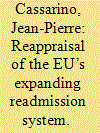| Srl | Item |
| 1 |
ID:
134515


|
|
|
|
|
| Summary/Abstract |
What is the relationship between respect for labor rights and foreign direct investment (FDI)? This study explores this connection with an emphasis on the strategic role of governments in attracting FDI. We present a formal model demonstrating that governments can do so by setting the level of labor rights protection and, as a consequence, investors will choose to invest in the face of tough labor regulations or cease investing, anticipating that the costs of abiding by these regulations will be too high. The model also suggests that governments will have an incentive to implement labor regulations when enforcement costs are sufficiently low or the profits from investment are sufficiently high. Using data from developing countries across time, error correction models test the dynamic nature of these hypotheses and find support for them: strict labor laws tend to decrease inflow of FDI, but more FDI tends to encourage better labor practices.
|
|
|
|
|
|
|
|
|
|
|
|
|
|
|
|
| 2 |
ID:
134644


|
|
|
|
|
| Summary/Abstract |
A common consequence of the fragmented supply practices of multinational corporations are unfair and exploitative working conditions in the global South. Many corporations face this, and the resulting reputational damage, by installing voluntary codes of conduct in their supplier factories, leading to a vast range of implementation practices by the factory managers. Despite this effort, the literature shows that the positive impact of these codes on labour conditions in such factories remains insufficient. This article argues that this insufficiency is rooted in the exclusiveness and eurocentrism of codes of conduct and elaborates on why corporations tend to prefer influencing certain labour conditions over others. It concludes by briefly discussing multi-stakeholder organisations as a possible solution to these predicaments, and points the way to further research on the topic.
|
|
|
|
|
|
|
|
|
|
|
|
|
|
|
|
| 3 |
ID:
134243


|
|
|
|
|
| Summary/Abstract |
In this article the focus is on law that governs the transfer of academic employees in Swaziland. A literature study of relevant law sources brought a lack of higher education law that regulates the transfer of academic employees during a merger to light. It is this problem that the authors aimed to address in this article. The authors, in an attempt to provide a legal framework for the transfer of academic employees, considered general labour law and case law. The transfer of academics during the merger of three colleges into a private university in 2010 was studied as a practical example. The contribution of this article is that it provides information to higher education institutions in Swaziland who are contemplating merging, the legislature and policymakers who have to adopt law and policy exclusively regulating the transfer of employees in the higher education sphere and academic employees who may become transferees during future mergers.
|
|
|
|
|
|
|
|
|
|
|
|
|
|
|
|
| 4 |
ID:
135306


|
|
|
|
|
| Summary/Abstract |
Readmission is not simply a means of removing undesirable foreigners through coercive methods. When viewed as a way of ensuring the temporary stay of foreign workers in the labour markets of European destination countries, readmission may also impact on the participatory rights of a growing number of native workers facing equally temporary (and precarious) labour conditions, in a context marked by employment deregulation and wage flexibility. These implications have clear democratic significance. A new analytical perspective applied to the expansion and development of the readmission system, is aimed at promoting a reflection on an unexplored research area bridging the gap between labour migration regulation and labour market deregulation.
|
|
|
|
|
|
|
|
|
|
|
|
|
|
|
|